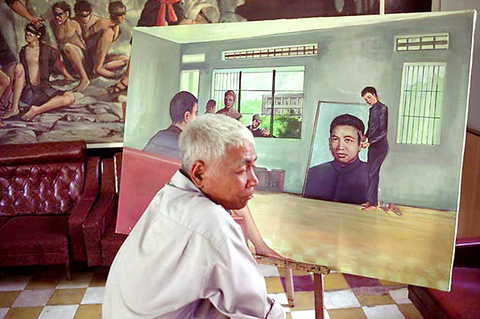When Cambodia recently staged a national film festival, serious drama was in gruesomely short supply: almost half the entries were low-budget horror flicks.
It wasn't always thus.
In the 1960s, now-retired King Norodom Sihanouk was not only the patron of a Cambodian film industry, he was one of its most active practitioners. He wrote, directed and even acted in his own high-minded if formulaic romances and tragedies.

PHOTOS COURTESY OF FOX MOVIES
More than 300 Cambodian films were made during that vibrant era, some well-received in other Asian countries.
But when the communist, puritanical Khmer Rouge regime came to power in the mid-1970s it banned all kinds of entertainment and smashed cameras and film-making equipment.
As the country's spirit began to recover from the Khmer Rouge era, and economic revival took hold in the early 1990s, the industry began to rebound. More than 100 production houses sprang up, mostly using video equipment to churn out movies on a shoestring.
But most of them collapsed because of their amateurism, and the industry is still struggling to recover its former glory.
These days, about five movie making companies have the expertise and strong finances to succeed, said Chheng Sovanna, head of the Culture Ministry's movie production office.
``Most of them are accidental producers, who just spent US$3,000 on a camera, bought some tapes, turned on the light and started shooting,'' said Chheng Sovanna, himself a director who graduated from Russia's State Institute of Cinematography. ``We don't understand the way they make movies.''
And the filmmakers lean more toward anarchy than artistry on screen.
At the recent festival, a typical movie featured a female vampire baring her canine teeth in a grin as she looked for prey. In Nieng Arp, or Lady Vampire, a flying female head with internal organs dangling beneath it chased a terrified couple in the dark.
Nine of the festival's 22 entries were in a similar vein.
``We make movies to suit the domestic market and the demand of our youths,'' said Korm Chanthy, the manager of FCI Productions, which made Nieng Arp.
``They like to watch horror movies because they make them feel excited, thrilled and terrified,'' he said.
The government wasn't impressed. The filmmakers ``injected too much hallucination and superstition'' into their work, complained Culture Minister Prince Sisowath Panara Sirivuth.
``Their understanding of moviemaking is that it's just business,'' he said. ``And they have this misperception that, without training, they can still make movies.''
The government has touted the idea of establishing a film school, but in a country so poor and reliant on foreign aid as Cambodia the idea is unlikely to get off the ground anytime soon.
Producer, 29-year-old Heng Tola, was looking to diversify his computer business when he founded Campro three years ago with several friends.
Making a movie takes Campro about three months and costs an average of US$30,000, including about US$1,000 for the lead actor, he said.
Despite the current taste for horror movies, Heng Tola believes a more serious trend is emerging, prompted in part by the resentment many Cambodians feel about its colonial past and toward domineering neighbors such as Thailand and Vietnam.
One of the festival entries was a nationalistic epic about a peasant protest against high tax imposed by Cambodia's colonial rulers, the French.
``The Cambodian movie is being reborn after a long absence. Its existence has been up and down, and the question now is how we can make it really stand,'' Heng Tola said.

Towering high above Taiwan’s capital city at 508 meters, Taipei 101 dominates the skyline. The earthquake-proof skyscraper of steel and glass has captured the imagination of professional rock climber Alex Honnold for more than a decade. Tomorrow morning, he will climb it in his signature free solo style — without ropes or protective equipment. And Netflix will broadcast it — live. The event’s announcement has drawn both excitement and trepidation, as well as some concerns over the ethical implications of attempting such a high-risk endeavor on live broadcast. Many have questioned Honnold’s desire to continues his free-solo climbs now that he’s a

As Taiwan’s second most populous city, Taichung looms large in the electoral map. Taiwanese political commentators describe it — along with neighboring Changhua County — as Taiwan’s “swing states” (搖擺州), which is a curious direct borrowing from American election terminology. In the early post-Martial Law era, Taichung was referred to as a “desert of democracy” because while the Democratic Progressive Party (DPP) was winning elections in the north and south, Taichung remained staunchly loyal to the Chinese Nationalist Party (KMT). That changed over time, but in both Changhua and Taichung, the DPP still suffers from a “one-term curse,” with the

Jan. 26 to Feb. 1 Nearly 90 years after it was last recorded, the Basay language was taught in a classroom for the first time in September last year. Over the following three months, students learned its sounds along with the customs and folktales of the Ketagalan people, who once spoke it across northern Taiwan. Although each Ketagalan settlement had its own language, Basay functioned as a common trade language. By the late 19th century, it had largely fallen out of daily use as speakers shifted to Hoklo (commonly known as Taiwanese), surviving only in fragments remembered by the elderly. In

Lines between cop and criminal get murky in Joe Carnahan’s The Rip, a crime thriller set across one foggy Miami night, starring Matt Damon and Ben Affleck. Damon and Affleck, of course, are so closely associated with Boston — most recently they produced the 2024 heist movie The Instigators there — that a detour to South Florida puts them, a little awkwardly, in an entirely different movie landscape. This is Miami Vice territory or Elmore Leonard Land, not Southie or The Town. In The Rip, they play Miami narcotics officers who come upon a cartel stash house that Lt. Dane Dumars (Damon)